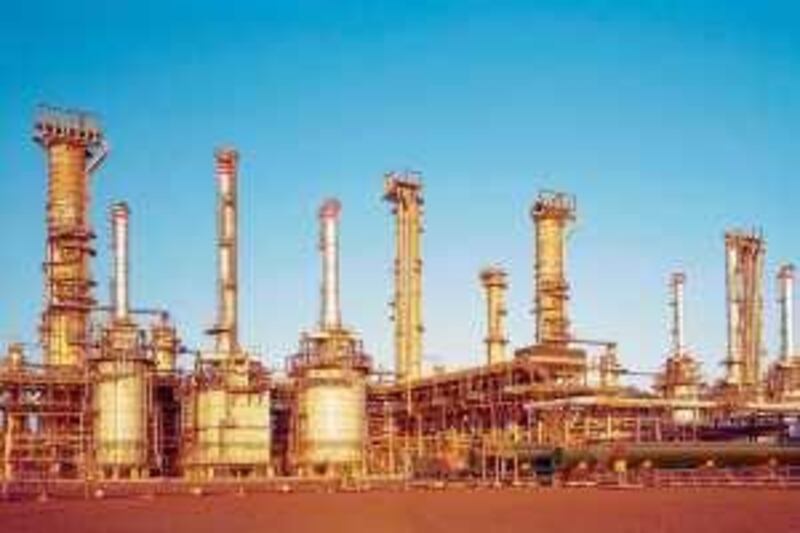China has emerged from the global financial downfall as the energy banker of last resort to the world. Since February, Beijing has signed US$48 billion (Dh176.25bn) of long-term loan-for-energy agreements with cash-strapped oil and gas exporters. The recipients have little in common beyond overstretched national treasuries and large, untapped oil and gas resources, significant chunks of which will now be developed with Chinese money.
In February, China Development Bank (CDB) agreed to lend $15bn to Rosneft, the Russian state-owned oil company, and $10bn to Transneft, the Russian oil pipeline monopoly, in return for deliveries of 300,000 barrels per day (bpd) of oil to China for 20 years. The agreement was the biggest energy deal ever struck between Moscow and Beijing, and will establish China as the main market for crude that Russia plans to pump from its new generation of oilfields in eastern Siberia.
The Russian deal was followed within days by multibillion-dollar loan agreements with Brazil and Venezuela. Petrobras, the Brazilian state-controlled oil company, agreed to supply between 100,000 and 160,000 bpd of crude at market prices to China National Petroleum Corporation (CNPC) and Sinopec, the Chinese state-owned refiner, in repayment of a $10bn loan from CDB to develop a large offshore oilfield.
Beijing also agreed to contribute $4bn to a joint investment fund in Venezuela in return for a pledge of up to 200,000 bpd of refined oil supplies from Petroleos de Venezuela (PDVSA), the Venezuelan national oil company. The $6bn fund, founded by CDB and Venezuela Bandes Bank, is expected to finance heavy oil developments in Venezuela's Orinoco belt, which contains some of the world's largest untapped oil deposits, and to be tripled to $18bn within the next nine years.
In March, Angola confirmed it had received a $1bn loan from Beijing. It was the latest in a series of oil-backed loans totalling at least $5bn that China has extended to the African OPEC member to rebuild infrastructure destroyed by the 27-year civil war that ended in 2002. In April, CNPC agreed to lend $5bn to KazMunaiGas, the Kazakh national energy company. The two companies also agreed to acquire MangistauMunaiGas, a Kazakh oil and gas producer, from Indonesia's Central Asia Petroleum.
CNPC, which already holds a 67 per cent interest in the Kazakh oil producer PetroKazakhstan, has recently said it saw central Asia as its key overseas oil and gas production base, shifting its focus from Africa. Further strengthening its position in the region, Beijing last month agreed to lend Turkmenistan $3bn to develop its huge South Yolotan gasfield, according to Turkmen state media reports. The field, appraised last year by the British firm Gaffney, Cline and Associates, is thought to be one of the five largest gas deposits in the world.
China has been looking at supplies from its ex-Soviet neighbour for some time, seeking to loosen Russia's grip on Turkmen gas exports. A 7,000km gas pipeline being built from Turkmenistan to China should be ready to transport up to 40 billion cubic metres of gas annually by the end of this year. Hit by volatility in the oil price, falling global energy demand and political uncertainties in many oil exporting states, international oil companies have been shying away from investment in regions where oil and gas reserves are especially costly to develop, or where rising resource nationalism has threatened profits or their ownership of assets.
Brazil and Angola, with deepwater offshore oilfields, and Venezuela with its ultra-heavy oil, are examples of the former. Russia and Venezuela stand out as examples of the latter. Debt financing for energy development in such countries has also become more expensive and difficult to obtain because of higher perceived risks to lenders. Yesterday, Standard & Poor's cut PDVSA's credit rating to four levels below investment grade, citing a significant deterioration of the company's cash position.
That has opened an opportunity for Beijing, which has strong foreign currency reserves and sees the need for vast amounts of energy to fuel its future economic growth,. It can count on its status as a rising world economic, political and military power to ensure that its new partners do not renege on supply commitments. In other recent developments, CNPC won a $4.7bn contract this month to develop phase 11 of Iran's South Pars gasfield, replacing the French energy group Total in the project that is linked to a plan to develop liquefied natural gas exports.
While the contract does not guarantee Iranian gas supplies to China, it should make them more likely in coming years. Chinese state oil companies are also rumoured to be interested in bidding for Addax Petroleum, a Canadian company that this month started exporting oil from Iraqi Kurdistan and also operates in west Africa. tcarlisle@thenational.ae





